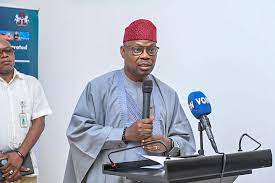By Iyemah David
The Nigeria’s Federal Government has reiterated its commitment to strengthening the health sector through innovative resource mobilisation amidst local government reforms.
Minister of State for Health and Social Welfare, Dr Iziaq Salako spoke at the Joint Annual Review (JAR) meeting in Abuja.
The aim of JAR is to evaluate progress across the health sector, focusing primarily on the effectiveness of the Sector-Wide Approach (SWAp).
The Joint Annual Review (JAR) serves as a vital platform for driving the Sector Wide Approach (SWAp) in Nigeria, uniting key stakeholders to assess progress, address challenges, and pinpoint opportunities for improvement.
By reflecting on achievements, openly discussing challenges, and identifying areas for improvement, JAR creates a constructive space for aligning on what matters most: improving health outcomes for all Nigerians.
Dr Salako said that the reforms aimed at making more funding available for health and social welfare, directly impacting the lives of Nigerians.
He noted that ongoing tax and spending reforms were freeing up resources from less efficient sectors, allowing these funds to be redirected toward critical areas like health care.
According to him, by granting local government areas financial autonomy, they are better positioned to take on active role in primary health care, thereby improving grassroots-level health services.
“Local governments are now empowered with more resources to focus on primary health care.
“Stakeholders in the health sector must ensure that a good portion of these resources is allocated to social welfare, particularly health, so we can sustain this reform agenda and make lasting impacts on the health of the average Nigerian,” he said.
The minister highlighted the need for commissioners and local government authorities to prioritise health funding as a means to sustain the momentum of current reforms.
He pointed out that state governments, now receiving increased funding, also have an essential role in directing resources toward social welfare programmes that benefit citizens directly.
According to Salako, the financial autonomy granted to local governments will empower them to better address primary healthcare needs, improving service delivery in underserved communities.
He said that decentralised funding is crucial for supporting health care reforms that aim to reduce disparities and improve outcomes across Nigeria.
As part of a broader push for decentralised health funding, he encouraged health stakeholders to work collaboratively, ensuring that resources reach the most critical areas.
He reiterated the government’s focus on resource mobilisation as a sustainable means to bridge funding gaps and drive positive changes in the health sector.
According to some stakeholders at the event, the minister’s remarks offer a hopeful outlook for Nigeria’s health sector, outlining a vision for a future where resources are effectively allocated to meet the country’s pressing health and social welfare needs.
Several local and international stakeholders, including donors and civil society organisations were present at the event.




